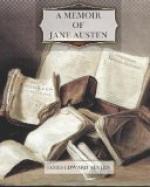the metropolis and the country, who should be something
like Beattie’s Minstrel—
Silent when glad, affectionate tho’
shy,
And in his looks
was most demurely sad;
And now he laughed aloud, yet none
knew why.
Neither Goldsmith, nor La Fontaine in his “Tableau de Famille,” have in my mind quite delineated an English clergyman, at least of the present day, fond of and entirely engaged in literature, no man’s enemy but his own. Pray, dear Madam, think of these things.
’Believe me at all times with
sincerity
and respect, your faithful and obliged
servant,
‘J. S. CLARKE, Librarian.’
The following letter, written in reply, will show how unequal the author of ‘Pride and Prejudice’ felt herself to delineating an enthusiastic clergyman of the present day, who should resemble Beattie’s Minstrel:—
’Dec. 11.
’DEAR SIR,—My “Emma” is now so near publication that I feel it right to assure you of my not having forgotten your kind recommendation of an early copy for Carlton House, and that I have Mr. Murray’s promise of its being sent to His Royal Highness, under cover to you, three days previous to the work being really out. I must make use of this opportunity to thank you, dear Sir, for the very high praise you bestow on my other novels. I am too vain to wish to convince you that you have praised them beyond their merits. My greatest anxiety at present is that this fourth work should not disgrace what was good in the others. But on this point I will do myself the justice to declare that, whatever may be my wishes for its success, I am strongly haunted with the idea that to those readers who have preferred “Pride and Prejudice” it will appear inferior in wit, and to those who have preferred “Mansfield Park” inferior in good sense. Such as it is, however, I hope you will do me the favour of accepting a copy. Mr. Murray will have directions for sending one. I am quite honoured by your thinking me capable of drawing such a clergyman as you gave the sketch of in your note of Nov. 16th. But I assure you I am not. The comic part of the character I might be equal to, but not the good, the enthusiastic, the literary. Such a man’s conversation must at times be on subjects of science and philosophy, of which I know nothing; or at least be occasionally abundant in quotations and allusions which a woman who, like me, knows only her own mother tongue, and has read little in that, would be totally without the power of giving. A classical education, or at any rate a very extensive acquaintance with English literature, ancient and modern, appears to me quite indispensable for the person who would do any justice to your clergyman; and I think I may boast myself to be, with all possible vanity, the most unlearned and uninformed female who ever dared to be an authoress.
’Believe me, dear Sir,
’Your obliged and faithful
humbl Sert.
‘JANE AUSTEN.’ {122}




